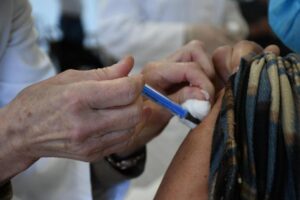AstraZeneca: Canada ahead on his way, waiting on Ema decision
 TORONTO – Canada is continuing its immunization campaign with the three vaccines approved by the regulator. The confirmation came from the health authorities, who clarify the case related to AstraZeneca, while in Europe the final decision of EMA (the European drug body) regarding the resumption of the use of the vaccine of the Anglo-Swedish consortium, blocked in many countries, is expected for tomorrow.
TORONTO – Canada is continuing its immunization campaign with the three vaccines approved by the regulator. The confirmation came from the health authorities, who clarify the case related to AstraZeneca, while in Europe the final decision of EMA (the European drug body) regarding the resumption of the use of the vaccine of the Anglo-Swedish consortium, blocked in many countries, is expected for tomorrow.
Theresa Tam, Our Country’s Chief Public Health Officer, took stock. “Health Canada is aware of some adverse events in Europe as a result of immunization with AstraZeneca, but we want to reassure Canadians that the benefits of the vaccine continue to outweigh its risk. At the moment there is no concrete data to confirm the link between adverse events and the administration of this vaccine, while in Canada we have not recorded any kind of safety problem”.
A position, that of Tam, which was also reiterated by Howard Njoo. “The data available to us – underlined the Deputy Chief Public Health Officer – show that the number of adverse events that have occurred to those who have received the AstraZeneca vaccine does not deviate from the rate that occurs in the general population. In addition to this – added Njoo – I want to point out that the AstraZeneca vaccines used in Canada do not come from the same European batch, but are produced in India”.
Also, yesterday came the opinion on the World Health Organisation. “At this time, the Who believes that the benefits of the AstraZeneca vaccine – it reads in a note – outweigh the risks and recommends that vaccinations continue. The World Health Organization recalls that it is “in regular contact with the EMA and regulatory authorities around the world for the latest information on the safety of COVID vaccines. The WHO Advisory Committee on Vaccine Safety is carefully evaluating the latest data available on AstraZeneca, once the review is completed, the WHO will immediately communicate the results”. The Organization, therefore, emphasizes that vaccines against Covid “will not reduce diseases or deaths for other causes: thromboembolic events are known to happen frequently, venous thromboembolism is the third most common cardiovascular disease globally”.
“In extended vaccination campaigns – concludes the note – it is routine for countries to report potential adverse effects after immunization. This does not necessarily mean that events are related to vaccines, but it is still good practice to investigate these. It also shows that the surveillance system works and that effective controls are in place.”
Also yesterday the chain of events that led to the suspension of the administration of the vaccine was communicated. The main problem has been in Germany, as confirmed by the Italian Minister of Health Roberto Speranza. “The suspension, which took place on 15 March in Italy, Germany, France, Spain and then followed in many other European countries, was the result of a confrontation first between the regulatory agencies and then between the health ministers in constant liaison with the heads of the executive. The prestigious Paul Ehrlich Institut – reports Speranza – has reported in Germany seven cases of thrombosis that occurred between 4 and 16 days after the administration of the vaccine in young patients, between 20 and 50 years old, among which very rare forms of cerebral thrombosis of venous breasts in conjunction with plateletsnopenia and bleeding. This evidence led German experts to suggest that vaccination with AstraZeneca should be suspended.”


